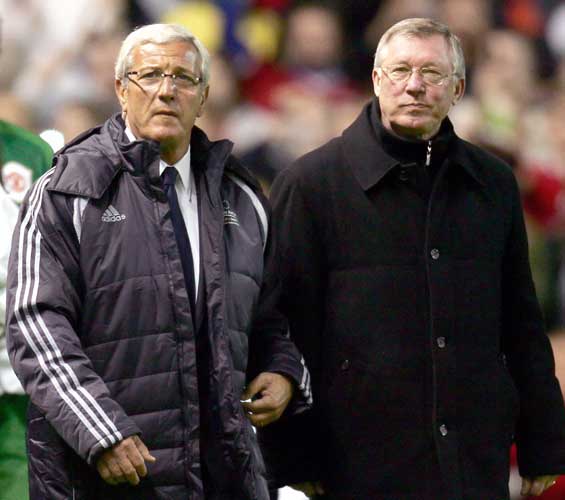Fergie's Euro memories: 'Lippi smoked a cigar while I was being drowned'
As he aims for yet another major final, Sir Alex Ferguson talks Andy Roxburgh through his memories of European campaigns

It is over 25 years since you first won a European trophy. How have the ingredients for success changed in that time?
Well, they have certainly changed in terms of the back-up required, particularly in the area of sports science. Medical information, nutrition and preparation of players for top-level games have reached another level. What has not altered, in our case, is the insistence that players train to a high standard – we have always aimed for 100 per cent quality. I have never changed that approach because, in my opinion, what we do on the training pitch transfers to the match day. We never allow lazy training sessions. For me, the training is an opportunity for players to express themselves as professionals. Players who don't commit themselves at training can have a negative impact on the others and things then deteriorate into a shambles – then you are not a real football club. Also, at Manchester United and Aberdeen we have always had a great team spirit. You don't get perfection, and today with an increase in the number of egotistical players making it more demanding, it can be difficult for many managers. The intrusion of agents and player representatives means some players don't have the same personal responsibility as their counterparts of 20 or 30 years ago.
From a tactical point of view, what are the main developments you have seen in the Champions League during the last 10 years?
The speed of the transitional play is definitely quicker now. In addition, the coaching qualities have improved, and through sports science and technology you are able to examine your opponents more thoroughly. We can get the running times and stats on every player we play against. This is phenomenal information for any coach. But the one thing that never changes is your hope that you can find a Cristiano Ronaldo or a Lionel Messi – players who can change the game. One of the biggest changes in the game in recent years is the increase in the speed of transition. A lot of counter-attacking is different today, unlike the old classic Italian style of the 1960s when the ball was played long to an individual attacker that might get a one v one in a big space. Now players flood forward from midfield and from full-back positions, making it four or five supporting the fast break.
Which match would you describe as your "best ever" in Europe?
Without a doubt, the 7-1 victory over AS Roma at Old Trafford in the quarter-final of the 2006-07 Champions League was the best – it was a record score for the quarter-finals. We went into that game against a top Italian side that had beaten us 2-1 in the first leg. Our first-half performance was out of this world, and Luciano Spalletti's team were shell-shocked because our quick, one-touch play was exceptionally good. Some of our goals were brilliant, in particular the fluid, one-touch play leading to the strike by Alan Smith. That game certainly stands out. As does the 3-3 draw away to FC Barcelona, which should have ended up 20-20 the way both teams attacked.
What are the best and the worst aspects of coaching in European competitions?
The best, without question, is being on the big stage with all the great coaches in Europe, such as Marcello Lippi, Ottmar Hitzfeld, Carlo Ancelotti – strangely I never came up against Fabio Capello. I remember being in Turin and Signor Lippi was on the bench – wearing a leather coat and smoking a small cigar, smooth and calm, while I was a worker in a tracksuit being drowned in the pouring rain. To match yourself against the top coaches and to compete in all the great stadiums is marvellous.
Since the start of the Champions League, which opposition players have impressed you the most?
When I think of the current generation, Lionel Messi is top-level and, although he has never taken my breath away, Kaka has impressed, Zinedine Zidane was brilliant but without a doubt, Paolo Maldini has been my favourite – he has a wonderful presence, competitive spirit, athleticism, and although not the world's greatest technically, he has influenced all the AC Milan teams during his wonderfully successful era.
Andy Roxburgh is Uefa's technical director. Interview courtesy of 'The Technician – Uefa Newsletter For Coaches'
Join our commenting forum
Join thought-provoking conversations, follow other Independent readers and see their replies
Comments
Bookmark popover
Removed from bookmarks